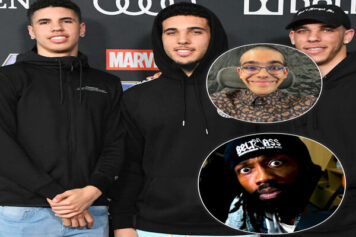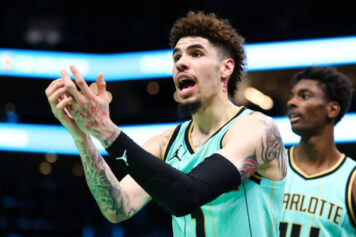It may sound crazy but, didn’t LaVar Ball create the Jr. NBA to help young basketball players prep for the professional ranks while bypassing college and sometimes even high school?
The father of NBA Brothers Lonzo and LaMelo Ball was heavily criticized for his rogue thinking and unconventional approach to his son’s education and careers. People hated it, even more, when he started a league and offered to pay guys who didn’t want to go to college and not make any money.
The court of public opinion is still trying to get at him, but the success of Lamelo Ball, on and off the court, is further proof of LaVar’s crazy genius.
The JBA idea was on point, but the funding got screwed up. The genius, however, was already out of the bag as the vultures gathered and looked to capitalize on the glimpse into the future that LaVar gave everyone.
READ MORE: G-League’s New Rule Dooms Lavar Ball’s JBA League
Once the G-League switched up its eligibility rule and upped its salaries past $100,000 effectively putting an end to LaVar Ball’s masterplan.
People yelled exploitation and greed and accused Lavar of the same exploitation he accused the NCAA of. They said he just wanted to build a league for his sons. Many people dismissed the chance that his motivation was to empower kids who would otherwise be swallowed up and spit out by the NCAA’s culture of what essentially amounts to free labor.
Athletic scholarships have stipulations that penalize and punish poor Black kids (many who survive meal to meal) while they sacrifice their bodies generating billions for athletic programs, TV networks and the governing body.
A few years later, the landscape has changed. Now everybody’s biting off Ball. First, the colleges started scrambling in a desperate effort to keep the top high school players under their control and passed new legislation allowing student-athletes to finally get paid off their likeness and license and market themselves on social media.
Thank you, Ed O’Bannon.
READ MORE: O’Bannon and Autonomy Are Only The Tip-Off Of The NCAA’s Seismic Shifts
For the most part, the elite prospects are heading to the G-League to get that bag. Jalen Green said no thank you to the NCAA and got paid $500,000 to play in the NBA G League as the top recruit in the 2020 class. As soon as the G League Pathway Program was announced, 2 other Top ESPN 100 5-star prospects shunned college to enroll; Daishen Nix (No. 6 rated Point guard among 2020 ESPN 100 recruits, No. 20 overall) de-committed from UCLA and Isiah Todd, who was previously committed to Michigan. Jonathan Kuminga as well.
READ MORE: As G League Steals More 5-Star Recruits, NCAA Says Athletes Can Get The Bag
NBA insider Woj spoke about the reaction around the NBA:
“Two things…this is what the NCAA said it wanted when Condoleezza Rice’s commission said that one and done should be eliminated, players who don’t want to be in college basketball should have a legitimate option out there…now it’s with the G League professional pathway program
The NBA would prefer to have one-and-done finished, they have not agreed with the Player’s Association on how that would look and a deal that would allow players to go right into the NBA, so this is really a bridge program and what’s changed is the money.
The NBA’s willingness to pay between $250K-$500K for the elite players… which is much better than the previous program that paid $125,000 and you have to go through the rigors of a hectic G-League travel schedule.
This benefits both sides. The NBA gets its elite prospects in an environment that they can control and maybe in a year or two, who knows what college athletics will look like (as far as top tier talent) because the G-League Pathway program is now a training ground for future NBA players.”
Overtime Elite League
The floodgates are open and now we have Overtime CEO Dan Porter announcing that they will start a league for 16-18-year-olds that can earn them $100,000 a year. The Overtime Elite League will allow players to bypass the traditional high school and college levels of basketball while building their personal brand before becoming eligible for the NBA.
New Overtime Elite league chips away at traditional college path to NBA https://t.co/x1tPUaimEr pic.twitter.com/kHR4Ov2Vok
— Sports Roadhouse® (@SportsRoadhouse) March 9, 2021
Again, the rub had always been that the NCAA gave itself permission to profit off the likenesses of players while forbidding them from doing so themselves. Waiting too long to correct that major flaw has led to this.
The OEL will begin in September with 30 players and will be based in one location. That location is still currently to be determined.
The league will pay upwards of $100,000 per player and will provide all health insurance, while also allowing players to earn bonuses and overtime equity. This despite early skepticism from former and now-departed NBA commissioner David Stern, who eventually bought into the vision in 2017, three years prior to his death.
Overtime itself is a big distributor of original sports content on social media, which includes Snapchat, YouTube, owned by Google and Instagram, owned by Facebook, and sells clothing with its logos and branding. With most of its content centered around high school or amateur players, it doesn’t license highlights or material from the big sports leagues.
Porter and Zachary Wiener, both former executives of the William Morris Endeavor, co-founded Overtime in 2016 with investments from the aforementioned Stern and others. Since 2016 the company has built a huge part of its brand (Gen Z) following on high basketball players.
The company has a robust 40 million followers within its social media channels and has built its credibility and reputation as a force to be reckoned with, getting acknowledged as such by NBA stars such as New Orleans Pelicans star Zion Williamson and Atlanta Hawks star Trae Young. These two were featured weekly during their time playing high school basketball.
Overtime has made the claim that its content is streamed over 1.7 billion times per month across its social media platforms, which is huge among Gen Z. Numbers show ages 13-24 like and prefer highlights and fast-paced sports content. They also prefer basketball over any other sport.
Educational Component
Many will ask how this could affect the “Good Ole Boy Network” also known as the NCAA. After spending two years gathering information, families expressed disapproval of the current path to the pros for student-athletes. Too many “athletes” were falling through the cracks and not completing their education, while also not advancing to pro ball.
Overtime will address the education side by providing top-notch education, residences, and training to the athletes. While also offering advanced analysis of the athlete’s performance designed to help them improve. But the bigger picture is them having the rights to capitalize on their brand while still getting paid to participate.
“We’re the only country in the world that requires you to go to high school and college to become a professional athlete, at least in basketball, football and soccer,” Porter mentioned
This could very well serve as a new path to the NBA. This route allows young players to train and prepare in the program until they become draft eligible. However, the huge catch here with the Overtime Elite League is if this doesn’t work out the players lose their amateur status and can no longer attend college and play.
Those that choose to not pursue professional careers will be given an extra $100K for college tuition, but again by participating in the league you lose your college eligibility.
Big Names Backing Overtime Pro League
The league is backed by some big-name NBA players like Carmelo Anthony, who is a board member and investor, and believes many athletes aren’t properly prepared for the life of a professional athlete.
Kevin Durant is another investor along with Silicon Valley venture capitalist Andreessen Horowitz. The league’s commissioner is Aaron Ryan who has an NBA background, and former Sacramento Kings assistant general manager Brandon Williams will oversee all league operations.
All these investors are influential in their own right but no one was more influential than the late David Stern, as he was the first to invest ($2.5M) after trying to convince Porter to not try and start another league. He mentioned how much work and time it took (30 Years) to build the NBA into a brand.
But after watching Overtime go to new heights with Gen Z, Stern quickly became convinced that this could work and be long-standing. His final words were “you can and will do it as it’s needed, by creating your own path and staying the course.”



